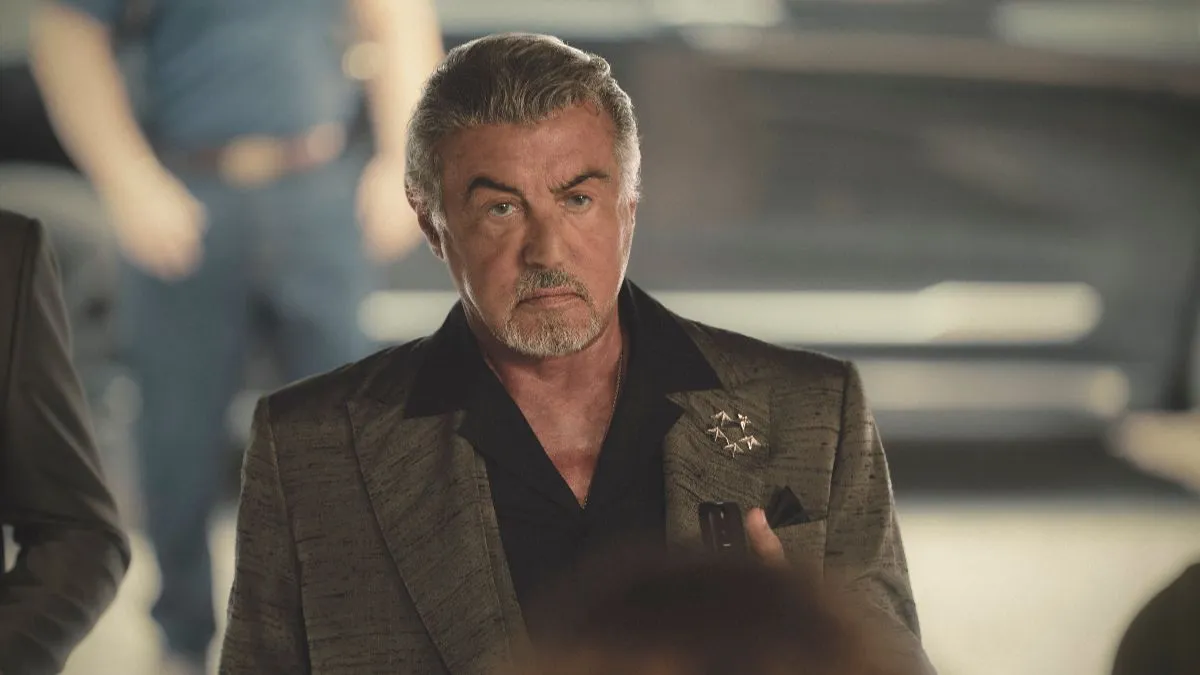TL;DR: Stallone rages against the algorithm in Tulsa King Season 3 Episode 3 — a darkly funny, surprisingly emotional hour where one dumb mistake changes everything. A strong return to form for Paramount’s weirdest crime drama.
Tulsa King Season 3
If you’ve ever watched Sylvester Stallone curse at a self-driving car, you know Tulsa King doesn’t do subtle. Episode 3 of Season 3 might be the most “Stallone versus the modern world” the show has ever been — an hour where the old-school mobster finds himself knee-deep in algorithms, bingo fraud, and Texan bomb-makers. Somehow, it’s both hilarious and tragic, which might just be the series’ superpower.
After two episodes of setup and slow-burn threats, Episode 3 finally throws a match on the whiskey barrel. The Dunmires — a local dynasty of cowboy sociopaths led by Robert Patrick’s Jeremiah — have decided Dwight Manfredi and his ragtag crew need to be erased. That’s fine by Dwight; he’s been erasing problems since VHS was king. The issue is, his team? Not exactly composed of Corleones.
The General and His Chessboard of Fools
Dwight opens the episode trying to hold his empire together with sheer charisma and leftover mafia etiquette. He gives one of those Stallone monologues that sound like a gravel avalanche: “No mistakes. These guys are waiting for one f***ing mistake.” Of course, everyone immediately makes one.
While Dwight’s on the road with FBI agent Musso (Kevin Pollak), his underlings — Tyson, Grace, Bodhi, and Goodie — decide it’s a great time to “get proactive.” Their target: Cole Dunmire, Jeremiah’s son, a man whose idea of organized crime involves bingo night. It’s classic Tulsa King lunacy — mobsters running surveillance at a church fundraiser — and it works because the show never forgets that its criminals are just as absurd as they are dangerous.
Tyson, played with perfect hot-headed energy by Jay Will, keeps insisting he’s ready to step up. The problem is he’s still playing checkers while Dwight’s playing chess — and he’s using the wrong board. Watching Tyson barrel headfirst into disaster is both funny and heartbreaking; he’s the embodiment of every overconfident rookie who thinks loyalty is the same as wisdom.
Road Trips, Bombs, and Bureaucrats
Meanwhile, Dwight and Musso hit the highway on a “team-building” mission to Texas to track down a bomb-maker known as The Watchmaker. The entire subplot feels like a buddy-cop movie directed by someone who’s had too much bourbon. Pollak’s Musso is all dry sarcasm and bureaucratic sleaze, and Stallone plays off him beautifully — two old dogs circling each other, one pretending he’s still got a leash.
When they finally meet the Watchmaker, the scene hums with that Taylor Sheridan tension: dusty Americana, hidden weapons, ticking clocks. Dwight pretends to be a customer; the Watchmaker pretends not to notice. It’s a standoff between two relics — craftsmen in professions the world no longer has room for.
The real punchline? The mission’s a setup. Musso’s not just chasing criminals; he’s using Dwight as bait. And Stallone’s performance in that moment — the flicker of betrayal behind the sunglasses — is pure gold. He doesn’t rage; he deflates. For a man like Dwight, losing control is worse than losing a fight.
Meanwhile in Tulsa: Bingo, Booze, and Bad Decisions
Back home, chaos blooms like cheap perfume. Tyson’s “recon” mission turns into a full-blown scam bust when the crew discovers Cole Dunmire’s running a bingo con, fleecing retirees for pocket change. It’s ridiculous, and it’s perfect. Tulsa King has always understood that modern crime is rarely glamorous — it’s petty, messy, and embarrassingly human.
Goodie’s attempt to turn the tables — cheating the cheater — briefly works, until Cole catches wind and decides to return the favor with fists and guns later on. The whole plotline plays like a dark comedy about what happens when amateurs try to cosplay as gangsters.
And then there’s Mitch and Cleo. Their little road trip subplot — part doomed romance, part Southern Gothic melodrama — ends in literal flames as Cleo drunkenly torches her enemy’s front lawn. It’s the kind of scene that would be ridiculous in any other show, but here it’s par for the course. Tulsa King knows that impulsive acts of vengeance are its true currency.
The Beating
Inevitably, the episode’s chaos crashes into tragedy when Tyson gets jumped and beaten half to death by Cole’s goons. It’s brutal, fast, and gut-wrenching. Tyson, still defiant, spits blood and refuses to snitch — but in saving face, he dooms Dwight’s operation.
Because here’s the cruel irony: the one rule Dwight gave them was “don’t make a mistake.” And Tyson’s mistake — his pride, his need to prove himself — triggers the power shift that’s been brewing since episode one. When Dwight finds him bloodied and broken, the look in his eyes says everything: the chessboard just got flipped.
The Episode’s Real Theme: Legacy vs. Relevance
Episode 3 might be the most thematically clear Tulsa King has ever been. Beneath the violence and absurd humor, it’s really about generational decay — what happens when codes of honor outlive the world that made them necessary.
Dwight’s an analog man trying to survive in a digital battlefield. His enemies don’t respect codes, his allies don’t understand them, and the institutions he used to fear — the FBI, the mob — are just as fractured as he is. When he tells Musso, “I was legit until you pulled me back into this,” it’s more confession than complaint. He’s addicted to relevance.
That’s what makes Tulsa King fascinating even when it stumbles. It’s not just about organized crime; it’s about obsolescence. Every episode is another reminder that Dwight’s fighting entropy with a cigar and a code of ethics written in 1978.
Direction, Tone, and Why This Episode Works
Director Craig Zisk balances tones like a circus act: half dead-serious crime thriller, half absurdist comedy of errors. Somehow it works. The cinematography doubles down on the Western aesthetic — wide shots of Oklahoma plains cut against claustrophobic interiors that feel like cages.
The script (co-written by Terence Winter, of Sopranos fame) has that old HBO rhythm: dialogue that sounds natural until you realize it’s quoting philosophy. When Dwight scolds his team for being reckless, it’s not just mob leadership; it’s an old man’s lament for a lost world.
Even the pacing, which meandered in earlier episodes, finds its groove here. Every subplot — Dwight’s mission, Tyson’s arrogance, Mitch and Cleo’s chaos — converges neatly into a single theme: every empire falls because someone gets impatient.
Stallone, Still the Soul of the Series
Let’s be honest: Tulsa King lives or dies on Stallone. And here, he’s magnificent. Older, heavier, quieter — but still magnetic. His Dwight isn’t just a mobster; he’s a ghost of cinematic masculinity, wandering through a world that no longer believes in guys like him.
What makes Stallone’s performance so unexpectedly tender is the vulnerability beneath the bravado. When he says, “We just can’t do anything that makes us vulnerable,” you can hear the panic under the control. It’s a survival strategy for both Dwight and Stallone himself — two men out of time, refusing to fade gracefully.
Verdict
Episode 3, more than any other this season, nails what Tulsa King wants to be: a chaotic, character-driven collision of old-school grit and new-world absurdity. It’s equal parts mob drama, Western satire, and late-career Stallone therapy session.
The action lands, the humor bites, and the emotional fallout feels earned. Sure, some of the dialogue still sounds like it escaped from a 90s cop show, and a few subplots (looking at you, bingo hall) flirt with parody. But that’s the charm. This isn’t prestige TV pretending to be pulp; it’s pulp learning to be self-aware.
If you squint past the chaos, you’ll see a meditation on change — personal, cultural, generational. Dwight’s crew’s “big mistake” doesn’t just shift power; it resets the whole board. The next few episodes are clearly building toward a reckoning, and for the first time this season, I actually care who survives it.







